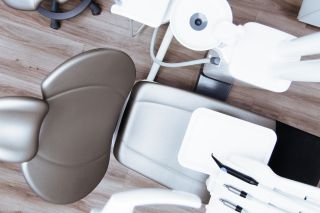Traumatic Brain Injury
Dental Health After Brain Injury
Does your dentist know how to protect your teeth after traumatic brain injury?
Posted August 25, 2023 Reviewed by Gary Drevitch

Medicine and dentistry too often ignore each other. This schism doesn’t serve anyone well, but those with brain injury tend to suffer more harm to their teeth. And since mouth health affects body health, brain injury-caused increased tooth decay may harm in the reverse, too.
Although some medical sites acknowledge head trauma can damage the cranial nerves, they don’t seem to include increased dental caries (demineralization of tooth structure) after traumatic brain injury, when Cranial Nerve IX may stretch as the neck bends back and forth, or is twisted, as in a car crash or other high-velocity impact.
I think most assume that fatigue and memory failure are the major impediments to maintaining good oral hygiene after brain injury. Certainly, neurofatigue reduces muscle strength to floss and impairs the stamina required to brush one’s teeth. Good dentists will prescribe electric toothbrushes and flossers. But cost may affect a person’s ability to pay to maintain or replace electric brushes; a person can always get a supply of free manual toothbrushes from their dentist but not electric models.
An occupational therapist may recommend sticky notes to aid memory. But (a) you have to register the note stuck on the mirror reminding you to brush your teeth; (b) remember which teeth you’ve brushed already as you brush them; and (c) remember if you’ve flossed or brushed at all before you leave home. And let’s say you’ve managed to find strategies around neurofatigue and memory failure — or better yet received treatment to heal them enough to reliably floss and brush twice a day — but your teeth continue to develop cavities. Why is that?
Cranial Nerve IX, the glossopharyngeal nerve, innervates the parotid glands, two glands that sit in front of your ears and produce 10 percent of your saliva; and during eating, up to 25 percent. These glands produce thin and watery saliva that contains amylase to “jumpstart starch digestion." Saliva plays an essential role in oral and overall health. The parotid glands produce saliva that lubricates your mouth; starts digestion; flushes harmful bacteria; and helps protect your teeth from cavities (see Alhajj and Babos).
My dentist explained to me that damage to the cranial nerve can change the composition of saliva and, as well, the amount the glands produce. This has a two-fold effect: Deficient saliva cannot protect your teeth as well as healthy saliva. And paltry saliva production doesn’t keep your mouth sufficiently moist, further worsening protection.
In addition, brain injury can create autonomic dysfunction. Although we may think of autonomic dysfunction as affecting the heart and blood pressure, it can also affect saliva production.
According to Alhajj and Babos, writing on the physiology of salivation for the National Library of Medicine, the "salivary glands are under autonomic control by both sympathetic and parasympathetic systems." The postganglionic fibers from the superior cervical ganglion innervate all the salivary glands in the sympathetic system. The parasympathetic system innervates through the facial nerve and glossopharyngeal nerve: "The parasympathetic innervation to the parotid gland preganglionic fibers of the glossopharyngeal nerve begins at the inferior salivatory nucleus and synapse on the otic ganglion. Postganglionic fibers reach the gland via the auriculotemporal nerve."
Interestingly, the authors note that researchers could use the autonomic system to develop treatments for chronic dry mouth and salivary gland atrophy.
According to Walker, Hurst, and Hall, Editors of Cranial Nerves IX and X: The Glossopharyngeal and Vagus Nerves, the “principal supranuclear control is from the hypothalamus.”
Brain injury increases sympathetic action, as I discussed in Concussion Is Brain Injury: Treating the Neurons and Me. Medicine may acknowledge the reactive stress response; your dentist may not know that traumatic brain injury can dry your mouth. As such, medicine and dentistry need to breach their chasm of non-communication to coordinate treating mouth health affected by autonomic dysfunction and impaired hypothalamic function.
To sum up, neurofatigue, memory failure, damage to Cranial Nerve IX, autonomic dysfunction, and hypothalamus damage can all, separately or together, worsen dental health after traumatic brain injury, creating a continual train of cavities, eventually leading to tooth loss and eroded gums. People on disability who can't afford implants or bridges are left with gaps, leading to problems with chewing and health, adding to their brain injury grief.
Yet in my search for research supporting what my dentist had taught me, the closest I could find about the effects of damage to the glossopharyngeal nerve was that stroke could cause nerve palsy, specifically the stroke syndromes Vernet, Collet-Sicard, and Villaret (including sympathetic fibers). Thomas, Minutello, and Das write in Neuroanatomy, Cranial Nerve 9 (Glossopharyngeal) that glossopharyngeal nerve palsy produces clinical symptoms including dysphagia; impaired gustation over the posterior third of the tongue and palate; reduced sensation over the posterior third of the tongue, palate, and pharynx; loss of carotid sinus reflex; absent gag reflex; and parotid gland secretory dysfunction.”
It is no small thing to have traumatic brain injury result in inexplicable cavity production and not be recognized. When medicine doesn’t acknowledge dental health, doctors freely prescribe medications that create dry mouth without recognizing the compounding effects of Cranial Nerve IX damage on that condition. They may advise you to talk to your dentist, but when you, with your brain injury, have to bridge the chasm between doctors and dentist but cannot retain instructions, you’ll forget how to combat dry mouth—or that you have it. Even if you remember, the dentist may not know they need to compensate for unhealthy saliva even though they’ll know about standard dry-mouth treatments.
My dentist stabilized my teeth and tooth pain through a combination of daily fluoride gel trays, high-fluoride toothpaste with potassium nitrate, mouthwash with fluoride and melaleuca oil twice a day, and easy-glide floss as I don’t have the strength to floss. They took a conservative approach to drilling and increased monitoring to three times annually to check my progress and halt additional caries. Rehab needs to incorporate this knowledge because healthy teeth are essential to quality of life.
Copyright ©2023 Shireen Anne Jeejeebhoy
References
Walker HK. Cranial Nerves IX and X: The Glossopharyngeal and Vagus Nerves. In: Walker HK, Hall WD, Hurst JW, editors. Clinical Methods: The History, Physical, and Laboratory Examinations. 3rd edition. Boston: Butterworths; 1990. Chapter 63. Available from: https://www.ncbi.nlm.nih.gov/books/NBK386/
Thomas K, Minutello K, M Das J. Neuroanatomy, Cranial Nerve 9 (Glossopharyngeal) [Updated 2022 Nov 7]. In: StatPearls [Internet]. Treasure Island (FL): StatPearls Publishing; 2023 Jan-. Available from: https://www.ncbi.nlm.nih.gov/books/NBK539877/
Alhajj M, Babos M. Physiology, Salivation. [Updated 2023 Jul 24]. In: StatPearls [Internet]. Treasure Island (FL): StatPearls Publishing; 2023 Jan-. Available from: https://www.ncbi.nlm.nih.gov/books/NBK542251/




